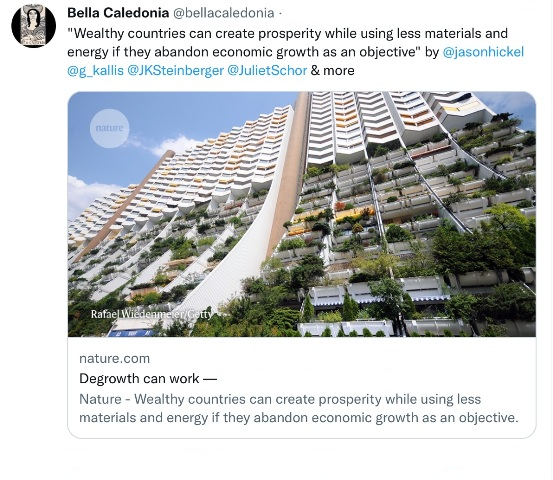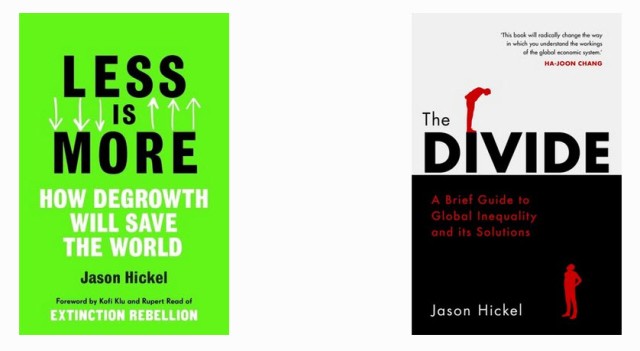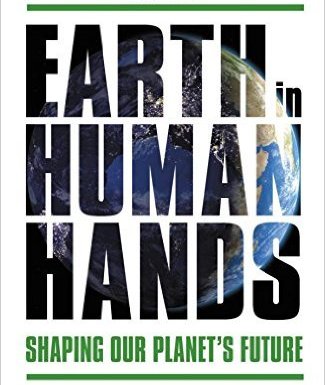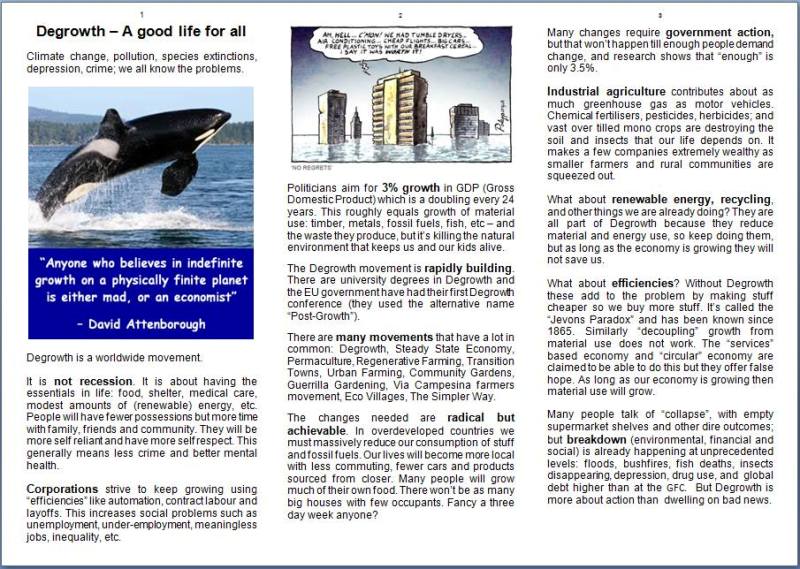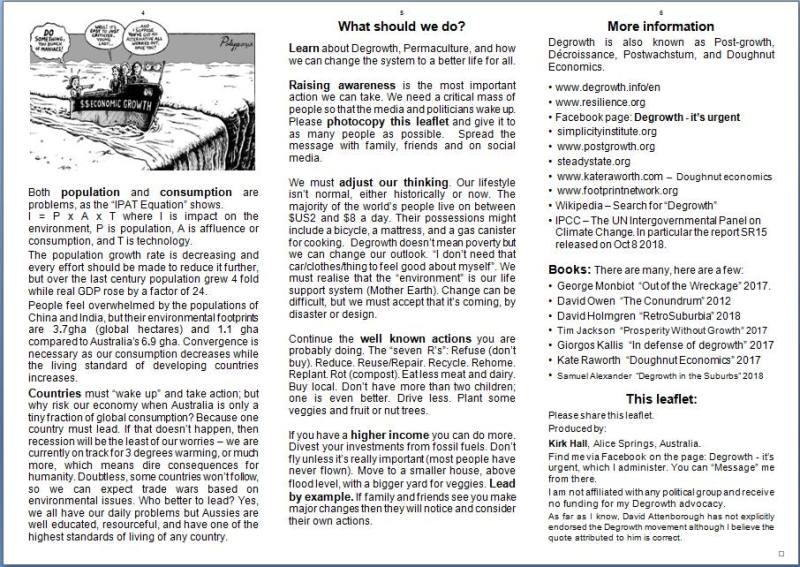Eco-economic Decoupling
'Smart Growth', Designed to Face the Challenges of The Commons
Bringing Together Eco-Economics, Justice & Ecology
GreenPolicy360 Siterunner: In 1995/96, as a principal figure in the formation of the US Green Party, I proposed a strategic plan at the 1995 national Green gathering in New Mexico and this led to my work over the next five years as a Green platform chair. The drafting of the founding platform included these words I wrote and I'll recall them here, KV #10 and especially "Quality of Life" from the Key Values and 'Call to Action' introduction to the platform.
The intent was to move the Green Platform beyond traditional orthodox economics. In the 1970s, at the New School in New York and with Congressman George E. Brown, I had begun to address environmental economics, the threats of climate and environmental disruption. In the presidential debate and campaign of 1992, when your GreenPolicy siterunner worked as a senior advisor for Gov. Jerry Brown, the Democratic party was at a crossroads as we advanced our Brown platform in contrast to the neo-liberal economic proposals of the Clinton campaign.
As I've described elsewhere, I carried over progressive economic ideas from the Brown campaign, and many other sources, to add depth and breadth to the new Green platform. The following platform language is, in effect, the beginning of addressing a new "Eco-nomics" and how a social-economic vision could become a reality. Going beyond GNP/GDP, going to environmental/worker/civil and human rights and standards, a 'quality of life' vision, was the goal. Here is how I first put the ideas for in the founding Green Platform of the US, a document that now resides with the Federal Election Commission and served as a a go-forward statement we proposed to draft an international 'Charter' to represent nearly 100 national Green parties.
10. FUTURE FOCUS AND SUSTAINABILITY
Our actions and policies should be motivated by long-term goals. We seek to protect valuable natural resources, safely disposing of or “unmaking” all waste we create, while developing a sustainable economics that does not depend on continual expansion for survival. We must counterbalance the drive for short-term profits by assuring that economic development, new technologies, and fiscal policies are responsible to future generations who will inherit the results of our actions.
QUALITY OF LIFE Our overall goal is not merely to survive, but to share lives that are truly worth living. We believe the quality of our individual lives is enriched by the quality of all of our lives. We encourage everyone to see the dignity and intrinsic worth in all of life, and to take the time to understand and appreciate themselves, their community and the magnificent beauty of this world.
Over the past two plus decades, this debate has ripened and dealing with the limitations and excesses (externalities) of traditional, orthodox economics has become literally a question of survival. The debate over future economic systems is here and now. Business-as-usual with it adverse impacts on quality of life and sustainability of life bring the question of economic growth and costs to all political parties.
The Greens were 'out in front', as it is said, but now the reality checks that Green politics brought forward are recognized widely. Growth is linked, "coupled", to environmental destruction. Signals, warnings, data and science are demonstrating clear and present danger. The time for action to protect quality of life is here.
Green Growth Debate / News & Opinion
July 2020
By Nafeez Ahmed
As societies get richer, they consume more resources. That also means they generate more pollution, driving climate change and destroying natural ecosystems.
We need to somehow break this link between material wealth and environmental catastrophe. That’s why financial institutions and governments have been focused on the idea of ‘decoupling’ GDP growth from resource use.
The idea of ‘decoupling’ is driven by the recognition that to stay within the ‘safe limit’ of 1.5 degrees Celsius, we have to dramatically reduce our material consumption of Earth's resources.
The assumption is that it is possible to continue growing the global economy while reducing our actual resource use and material footprint, perhaps by shifting to renewable energy.
This notion has been most recently articulated in the book More From Less: The Surprising Story of How We Learned to Prosper Using Fewer Resources—and What Happens Next, by Andrew McAfee...
GreenPolicy360: 'Myth' or not? Read more about McAfee's controversial book below. First read the Motherboard/Vice piece above by Nafeez Ahmed, with his book review and economic analysis -- then dive deeper into current economics, mainly capitalism in the West, and what GreenPolicy360 is developing in the form of "Eco-nomics" and a range of ideas within a New Economy movement.
Starting with Conventional Business-as-Usual
Capitalism, the 'Invisible Hand' & 'Free' Markets
Late 18th/Early 19th Classical Economics
Cut to the 21st Century: The challenge of ‘Decoupling’ GDP growth from Sustainability
Developing Gross Domestic Product + quality of life + environmental economics
What conditions would 1) enable reducing overall use of planet's resources, 2) reduce climate change impacts and 3) allow continued economic sustainability
Nafeez Ahmed (NA) / Insurge / July 2020
The conventional belief has been most recently articulated in a recent book, More From Less, by Andrew McAfee, principal research scientist the MIT Sloan School of Management. Financial and other data, McAfee argued, shows we can actually easily reduce our material footprint while continuing to grow our economies in a win-win scenario.
More From Less: The Surprising Story of How We Learned to Prosper Using Fewer Resources ― and What Happens Next
Critical reviews of More From Less:
This book uses falling US consumption of raw materials, energy and reducing US CO2 production to argue that resource use is decreasing despite ongoing economic growth since 1970.
Most of the consumption data referenced does not account for the fact that a large portion of US manufacturing has moved offshore in that period. Much of the data for raw material consumption is from the U.S. Geological Survey - National Minerals Information Center. I emailed them asking whether their consumption data includes imported finished goods - eg. automobiles and washing machines for steel consumption. They replied that this consumption data definitely would not. Energy consumption and CO2 production only include US based figures, ignoring the huge energy consumption and CO2 production in China which has been off shored with manufacturing our goods.
The core thesis of this book is therefore not backed up by data. I'm sure the author knows this and I think it is intellectually dishonest not to reference this in the book, especially when it is being used as a primary source of techno-optimism by Steven Pinker, Christine Lagarde, Eric Schmidt and Larry Summers.
Decoupling is a topic that has been studied extensively, with one recent overview finding over 1200 peer-reviewed research papers published between 1990 and 2015. As a result, there exists a voluminous body of research that has used better methods and covers far more ground, both theoretically and empirically, than this book. The conclusions of this research stream are fairly clear, as a recent, comprehensive and well-worth-the-read overview of decoupling research (Parrique et al. 2019) shows: while some decoupling is beyond doubt happening, there is no sturdy evidence that could permit us to believe that _necessary_ decoupling is going on.
If we wish to continue our present course and economic growth patterns, we would need to see decoupling that is 1) absolute, 2) deep enough, 3) fast enough, 4) permanent, and 5) global.
This is not what research shows, even though there is evidence that some countries have been able to slightly decrease the use of some resources (albeit even this finding diminishes once we account for the increasing financialization of the economy, as Kovacic et al. 2017 find for the EU-14).
The More From Less central message is basically demolished by a single open access article in PNAS (Wiedmann et al. 2015), not to mention other relevant research. Using far more sophisticated methods, informed by past research on the topic, and covering the value chains and countries far more extensively than this book, the Widemann et al. concluded that if the total materials footprint of industrialized countries, USA included, has decoupled at all, the amount of absolute decoupling is insignificant. I cannot find any reference to this rather fundamental piece of research in the book, nor can I find any references to any recent studies that are more critical about decoupling claims. In fact, I cannot find solid evidence, either in references or in the text, that the author is even aware that such research exists. As such, I do not believe that the book's thesis could ever be published in a reputable peer reviewed journal: existing research has already covered this ground repeatedly, with better methods.
In a positive note, the author is very clear that market fundamentalism - letting capitalism run amok - is emphatically NOT an answer to the environmental crises, and that we need a strong state to regulate and control the private interests, repair market failures and price the externalities. There is ample evidence that of all socio-economic systems we have tried so far, this approach - sometimes known as the Nordic model - has the best track record of creating and somewhat equitably distributing wealth. That said, I've already noticed that many proponents of this book haven't noticed these caveats, and instead claim that McAfee suggests unbridled capitalism is "the" answer.
However, despite rather serious flaws in the key argument, I have no doubt that the book will become a bestseller. We humans are so desperate to believe that nothing needs to change.
References
Kovacic, Z., Spano, M., Lo Piano, S. and Sorman, A.H. (2017). Finance, energy and the decoupling: an empirical study. Journal of Evolutionary Economics, 1-26.
Parrique T., Barth J., Briens F., C. Kerschner, Kraus-Polk A., Kuokkanen A., Spangenberg J.H. (2019). Decoupling debunked: Evidence and arguments against green growth as a sole strategy for sustainability. European Environmental Bureau.
Wiedmann, T. O., Schandl, H., Lenzen, M., Moran, D., Suh, S., West, J., & Kanemoto, K. (2015). The material footprint of nations. Proceedings of the National Academy of Sciences of the United States of America, 112(20), 6271–6276.
~
Nafeez Ahmed continues with his critique of those who, as with More From Less, believe that unbridled growth can be achieved alongside environmental sustainability. In other words, 'eco-economic decoupling' is possible. Ahmed's point of view is that the empirical research to date does not demonstrate viable, achievable ways to 'have it all', both environmental protection and unlimited growth.
(NA) / Decades of research on material flows confirm that there are “no realistic scenarios” for such decoupling going forward.
Combing through 179 of the best studies of this issue from 1990 to 2019 further reveals “no evidence” that any meaningful decoupling has ever taken place.
“The goal of decoupling rests partly on faith”, conclude the team from the BIOS Research Institute in Finland, an independent multidisciplinary scientific organisation studying the effects of environmental and resource factors on economy, politics, and culture. The BIOS team have previously advised the UN Global Sustainable Development Report on the risks of emerging biophysical limits to endless economic growth.
(NA) / This is how UN scientists are preparing for the end of capitalism
As the era of cheap energy comes to an end, capitalist thinking is struggling to solve the huge problems facing humanity. So how do we respond?
~
Environmental Politics
Raising the bar: on the type, size and timeline of a ‘successful’ decoupling
T. Vadén, V. Lähde , A. Majava , P. Järvensivu, T. Toivanen & J.T. Eronen
Published online: 24 Jun 2020
Currently the environmental impacts and resource use of many national economies is unsustainable. The only way the economy can grow or even remain at the present level is to ‘decouple’ it from these environmental impacts, thus staying within the planetary boundaries of resource use.
The problem is that many of the accounting measures used to conclude that decoupling is happening tend to systematically obscure or exclude critical data.
“The existence of decoupling in a bounded geographical area or economic sector does not, as such, mean that decoupling is happening in a wider context,” the UN BIOS team argues.
~
Jevons Paradox
“Well-known and widely studied phenomena such as Jevons’ paradox...”
In economics, the Jevons paradox (sometimes called the Jevons effect) occurs when technological progress or government policy increases the efficiency with which a resource is used (reducing the amount necessary for any one use), but the rate of consumption of that resource rises due to increasing demand. The Jevons paradox is perhaps the most widely known paradox in environmental economics. However, governments and environmentalists generally assume that efficiency gains will lower resource consumption, ignoring the possibility of the paradox arising.
~
'Eating the planet'
NA / The big, long picture is quite unequivocal. Global use of material resources has increased tenfold from 1900 to present, from less than 10 Gigatonnes (Gt) per year to roughly 88.6 Gt in 2017. In the decades since 1970, the rate of growth has actually accelerated, not slowed, as consumption has more than tripled.
Meanwhile, only 9–12 percent of materials are recycled, and about half of all resource use is used to provide energy in a broad sense. The other half is used for infrastructure such as buildings, transport, machines and consumer goods.
The BIOS authors find that there are certainly clear cases, limited to specific economic sectors or particular geographical regions, where we can find evidence of resource use seeming to diminish while GDP grows. But this is always linked to deepening of resource use elsewhere. The problem is that there is “no evidence of ongoing, global absolute resource decoupling.”
The situation is pretty serious. The scientists attempt to identify what genuine decoupling needs to look like, and then seek to discover whether there is any evidence that it is happening. They conclude that there is simply no viable scenario for decoupling:
“For absolute resource decoupling to make sense as a global goal, we would need a scenario where, in ca. 30 years (ca. indicates Circa – and signifies "approximately"), the economy produces 2.6 times more GDP out of every ton of material used, under conditions where material use diminishes ca. 40 percent globally. Currently, no trends corresponding to this scenario are observable and, to our knowledge, no concrete proposals with such a level of decoupling have been presented.”
~
Environmental Science & Policy
Decoupling for ecological sustainability: A categorisation and review of research literature
T.Vadéna V.LähdeaA.MajavaaP.JärvensivuabT.ToivanenacE.HakalaadJ.T.Eronenae
''Highlights
• We reviewed 179 articles on decoupling published between 1990–2019. • The papers present evidence of absolute impact decoupling, mainly between CO2 and GDP. • No evidence of economy-wide, national/international absolute resource decoupling. • No evidence of the kind of decoupling needed for ecological sustainability. • In the absence of robust evidence, the goal of decoupling rests partly on faith...
~
Eco-nomics, Greening the Economy
Eco-nomics Key Takeaway
As Jason Hickel of the London School of Economics has written:
“Over and over again, empirical data shows that it is possible to achieve high levels of human welfare without high levels of GDP with significantly less pressure on the planet. How? By sharing income more fairly and investing in universal health care, education, and other public goods. The evidence is clear: When it comes to delivering long, healthy, flourishing lives for all, this is what counts — this is what progress looks like.”
What wrong with 'Degrowth'? Problems beginning with the name itself
GreenPolicy360: As Jason Hickel and others push a campaign for what is sometimes called "Degrowth", the notion of Degrowth brings political baggage. To de-grow is a non-concept. What doesn't grow? How and why should growing be stopped? Or, to be more cognizant of what is seemingly being said with this 'degrowth' phrase, shouldn't a more reality-based term be put forward with which to organize do-able economic development. Wouldn't a 'smart economics' be more appropriate, more realistic, more do-able?
Think about it, but GreenPolicy360 cannot sign on to a 'Degrowth' or 'De-growth' campaign.... we are visionary, we are about 'living earth' systems, growing is part of living... and smart development, intelligent decision-making policy is one of the core concepts of 'Eco-nomics', a school of thought that we have been debating for decades, beginning with the 'Limits to Growth' discussions and debates of the early 1970s. 'Overconsumption', 'Planetary Boundaries', 'Ecological Economics', a 'New Economy Movement' and multiple other ideas/concepts/schools of thought/taglines are now in play and in our opinion, 'Degrowth' is an outlier in this evolving attempt to chart a course that resonates and is realistic in finding viable support among political groups, cultures and nations.
Jason Hickel
~
Eco-economics | Eco-nomics
References
Eco-Economic Policies, Proposals, Campaigns, Ideas
Keywords for Creative Economics
Affluenza; Compulsive buying; Consumerism; eCooperative Economics; Ecological Economics; Eco-nomics; 'Freedom Dividend'; 'Human-centered Capitalism'; Limits-to-Growth; Quality of Life; UBI/Universal Basic Income
______________
Flexible work-schedules / Four-day work week
_________
Universal Basic Income
_________
eCooperative Economics
Moving toward Co-operations instead of corporations ...
Corporations, as we have learned over decades, too often have top-down decision-making structures and imperatives to choose profit over all choices. Executive decisions are bound, executives hands are tied by legal obligations and terms like ‘fiduciary responsibility’ to shareholders, owners, to ‘maximize profit’. But profit is only one of a number of responsibilities of a smart eco-nomics. Decisions have to also take into account other shareholders – the workers who make the business possible, the sustainability of the business, the health of the community. It’s a connected world we know. We need a new eCO-Cooperative Economics and the Bread and Roses Party is here to talk about the future, now.
__________
@GreenPolicy360
'Eco-nomics', a paradigm in development
Beyond GDP to GDP+ Quality of Life
______________
Developing 'eCooperative Economics'
Visiting with John De Graaf
Bread & Roses 2020 Campaign
July 2, 2020
WE COMPETE FOR WAGES, WHEN WE SHOULD RESTRUCTURING THE ECONOMY TO PROVIDE THE BASICS MORE EFFICIENTLY TO EVERYONE. These articles are of course revealing, but much more important is to understand the costs of a modest home, healthy food, education, mobility, healthcare and retirement insurance...The goal should be to provide these basics with a decreasing amount of labor time so that people can live simply and modest lives without having to work themselves to death. Limiting costs of basics is more important than raising salaries (an exception at the bottom of course) because the salary increases often propel higher prices. It is of course, shocking, that there is such disparity in pay and that many of the most essential jobs--in service, caring for children and elders, etc. pay little while software jobs, whose goal is often simply to market stuff more effectively and profitably, earn so much. We need a discussion on what matters and how to insure a modest but secure life for everyone. And as St. Augustine put it long ago, we need a maximum income as much or more than we need a minimum wage.
Of course, many of us already knew these things but this is such an important article--sadly it will probably not be read by Republicans and defenders of the status quo. My only addition is that even the more egalitarian European lifestyles are not sustainable over time because of their environmental costs--so we need to both improve equity and reduce consumption in rich countries. Reliable science suggests the earth could support a 1960 American lifestyle for all humans given the current population and technology. Having lived at that time I can attest that most Americans felt richer then than they do now--I know I did. Material consumption is not the key to a happy life.
Reading for eCooperative Economics
References from John De Graaf
- https://www.resilience.org/stories/2018-10-11/we-need-an-ecological-civilization-before-its-too-late
·················································
Degrowth ... Smart Growth Strategies
Also known as Post-growth, Decroissance, Postwachstum, Zero-cost Politics, Doughnut Economics
Compulsive Buying / Rampant Consumerism
Affluenza
Degrowth ... Smart Growth 101
·················································
An emerging 'Doughnut' economic model is looking to shift focus from constant growth to balance, well being, and quality of life
A 'true-price' initiative rolls out in Amsterdam
Could the Doughnut model become the compass we need for creating a safe and just 21st century?
~
- Climate Change
- Climate Policy
- Earth Science
- Earth System Science
- Ecological Economics
- Eco-nomics
- Economic Development
- Economic Justice
- Economics
- Environmental Full-cost Accounting
- Environmental Laws
- Environmental Protection
- Environmental Security
- Environmental Security, National Security
- Envirosecurity
- Global Security
- Global Warming
- New Definitions of National Security
- New Economy
- Planet Citizens
- Resilience
- Social Justice
- Sustainability
- Sustainability Policies
- Whole Earth

